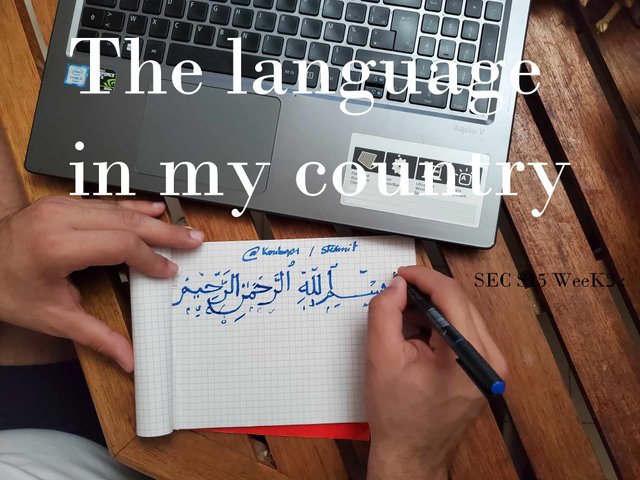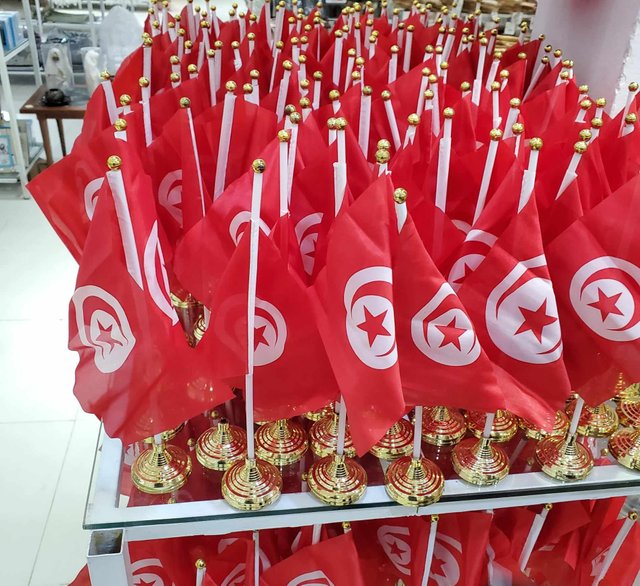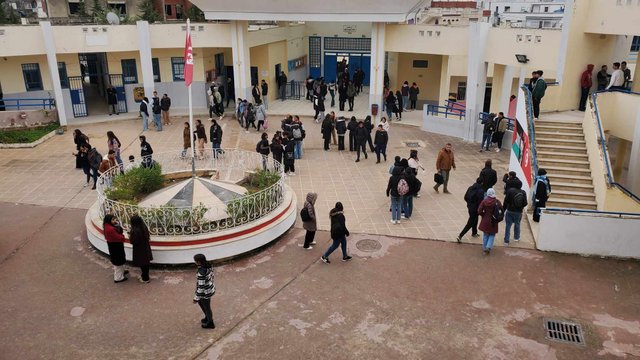Greetings, everyone!
I trust everyone is doing well. Personally, I feel a great sense of honor being part of the S15w2 engagement challenge. The selected topic is truly intriguing, and I genuinely relish the opportunity to participate in this competition.

What is the name of your country? How many languages can we find in your country?
Tunisia, my native country, is a Mediterranean jewel steeped in rich history and astonishing cultural diversity. Our main and mother tongue is Arabic, but our nation's openness to the world is reflected in our multilingual education system.
French and English play an important role in our education, with studies in these languages from the early years of primary school. Tunisian students thus have the opportunity to master these languages throughout their educational career.

At the secondary level, students have the opportunity to choose from several foreign languages. In addition to delving into French and English, options include languages such as German, Italian, Russian, Spanish, and even Chinese. This diverse choice reflects Tunisia's desire to promote multilingual education and prepare its citizens for global interaction.
This linguistic diversity is not only present in classrooms, but it is also manifested through the Tunisian diaspora, present in many countries around the world. Expatriate Tunisians contribute to the dissemination of our culture and our polyglotism, thus creating bridges between Tunisia and the rest of the world. It is a source of pride for us to see our fellow citizens actively participating in the international scene thanks to their mastery of several languages.
How many of the languages listed in your country do you know?
As a Tunisian, my knowledge of languages reflects the cultural diversity of my country. The Arabic language, as my mother tongue, is omnipresent in my daily life and in my interactions with Tunisian society.
Learning French and English early on was a crucial aspect of my educational journey. These languages are integrated into the education system from the first years of primary school, providing students with the opportunity to achieve solid mastery. For my part, I consider myself fortunate to have been able to develop advanced proficiency in these two languages, which greatly facilitates communication in international contexts.

Regarding optional languages at secondary level, I chose to study Italian for two years. This experience was enriching, as it allowed me to delve into Italian linguistics and culture. It also strengthened my overall understanding of Romance languages.
This linguistic diversity is not simply an academic skill, but has profound practical and cultural implications. It promotes intercultural understanding and facilitates exchanges with people from different regions of the world. My knowledge of these languages broadens my horizons, allowing me to appreciate global cultural richness and contribute to international connectivity. It is a source of personal pride, as it strengthens my ability to engage in an increasingly interconnected world.
How has this language improved/helped your life and business?
I strongly agree with this view, because as a computer science teacher and blogger on Steemit, English has played a pivotal role in improving my knowledge and skills in writing and communication.
As a teacher, fluency in English has given me access to an immense amount of online educational resources. Many tutorials, technical documents and discussions on new technologies are often in English. This greatly enriched my lessons and allowed my students to have access to up-to-date and relevant information.
As a blogger on Steemit, a platform with an international community, English has become the primary means of communication. This not only allowed me to share my IT knowledge with a global audience, but it also opened up opportunities to collaborate with other tech enthusiasts across the world.
The English language has also improved my writing skills. Writing articles in English for my blog has pushed me to refine my style, choose my words carefully, and express my ideas clearly and concisely. This has had tangible benefits in my teaching career, where clear communication is essential.
In summary, mastery of English has been a significant asset in my professional life. It has broadened my horizons, improved my IT skills through access to a diversity of resources, and played a crucial role in my ability to share my knowledge and experiences with a global audience. It’s a language skill that continues to bring me tangible benefits on a daily basis.
Are you ready to teach these languages to your children? Yes No. State your reason.
Of course, it is among my ambitions to teach these languages to my children, plus Chinese and German. Indeed, teaching these languages to my children is part of my educational ambitions. My motivation stems from several important considerations.

Source
First of all, regarding Chinese, my in-depth knowledge of this language allows me to perceive beyond language barriers. By passing this skill on to my children, I hope to broaden their horizons and connect them with a rich and ancient culture. With Chinese becoming more and more relevant on the global stage, I want to offer them a language skill that could be a huge asset in their future professional and personal interactions.
On the other hand, German represents for me a gateway to an influential European culture. As a native speaker of this language, I am aware of the importance of German in the fields of technology, science and business. By teaching this language to my children, I want to prepare them to evolve in a world where mastery of several languages can be a distinctive advantage.
In short, teaching Chinese and German to my children goes beyond simply passing on language skills. It’s a way to connect them to diverse cultures, stimulate their curiosity and equip them with tools that will be valuable in their future. It is an educational approach aimed at preparing them to adapt and succeed in an increasingly interconnected world.
Thank you very much for reading, it's time to invite my friends @hamzayousafzai, @suboohi, @ngoenyi to participate in this contest.
Best Regards,
@kouba01

Thank you, friend!


I'm @steem.history, who is steem witness.
Thank you for witnessvoting for me.
please click it!
(Go to https://steemit.com/~witnesses and type fbslo at the bottom of the page)
The weight is reduced because of the lack of Voting Power. If you vote for me as a witness, you can get my little vote.
Downvoting a post can decrease pending rewards and make it less visible. Common reasons:
Submit
Hello, hope your day is going well.It's great to read that Tunisia has Arabic French and English. Teaching your kids Chinese and German is smart for their future. Your love for languages is awesome. It's cool to see you sharing that with your kids , really enjoyed reading your blog wish you success 💖😊.
Downvoting a post can decrease pending rewards and make it less visible. Common reasons:
Submit
Hello! Thank you so much for your commrnt! I'm delighted to share my passion for languages, and it's heartwarming to know you enjoyed reading about it. Teaching my kids Chinese and German is indeed an exciting journey. Wishing you a wonderful day as well!
Downvoting a post can decrease pending rewards and make it less visible. Common reasons:
Submit
Greetings sir, language is the best medium of communication through which we can convey our thoughts to others. In your country Tunisia, the main language is Arabic, but multilingual education is taught to maintain international relations, including French and English. You have mastered French and English in addition to your mother tongue. You want to teach your children Chinese and German.
Downvoting a post can decrease pending rewards and make it less visible. Common reasons:
Submit
Greetings! Indeed, language is a powerful means of communication. In Tunisia, while Arabic is the primary language, the emphasis on multilingual education, including French and English, reflects the importance of international connections. Personally, I've dedicated myself to mastering French and English alongside my mother tongue. Thanks of the comment.
Downvoting a post can decrease pending rewards and make it less visible. Common reasons:
Submit
You mentioned that “Tunisia, my native country, is a Mediterranean jewel steeped in rich history and astonishing cultural diversity. Our main and mother tongue is Arabic, but our nation's openness to the world is reflected in our multilingual education system.” I really love Arabic and am amazed by it. I look forward to learning it someday. Great post sir. My best regards
Downvoting a post can decrease pending rewards and make it less visible. Common reasons:
Submit